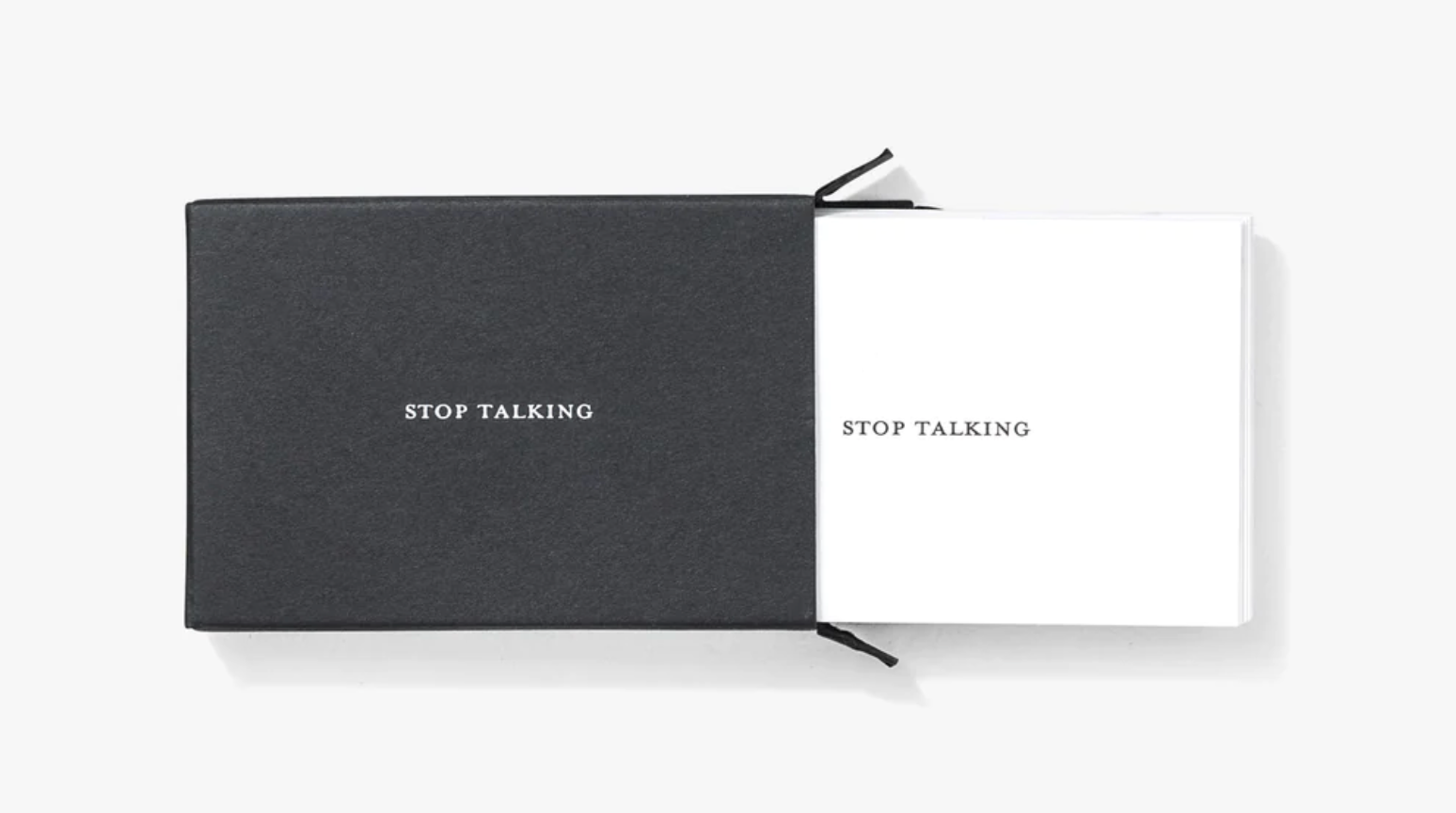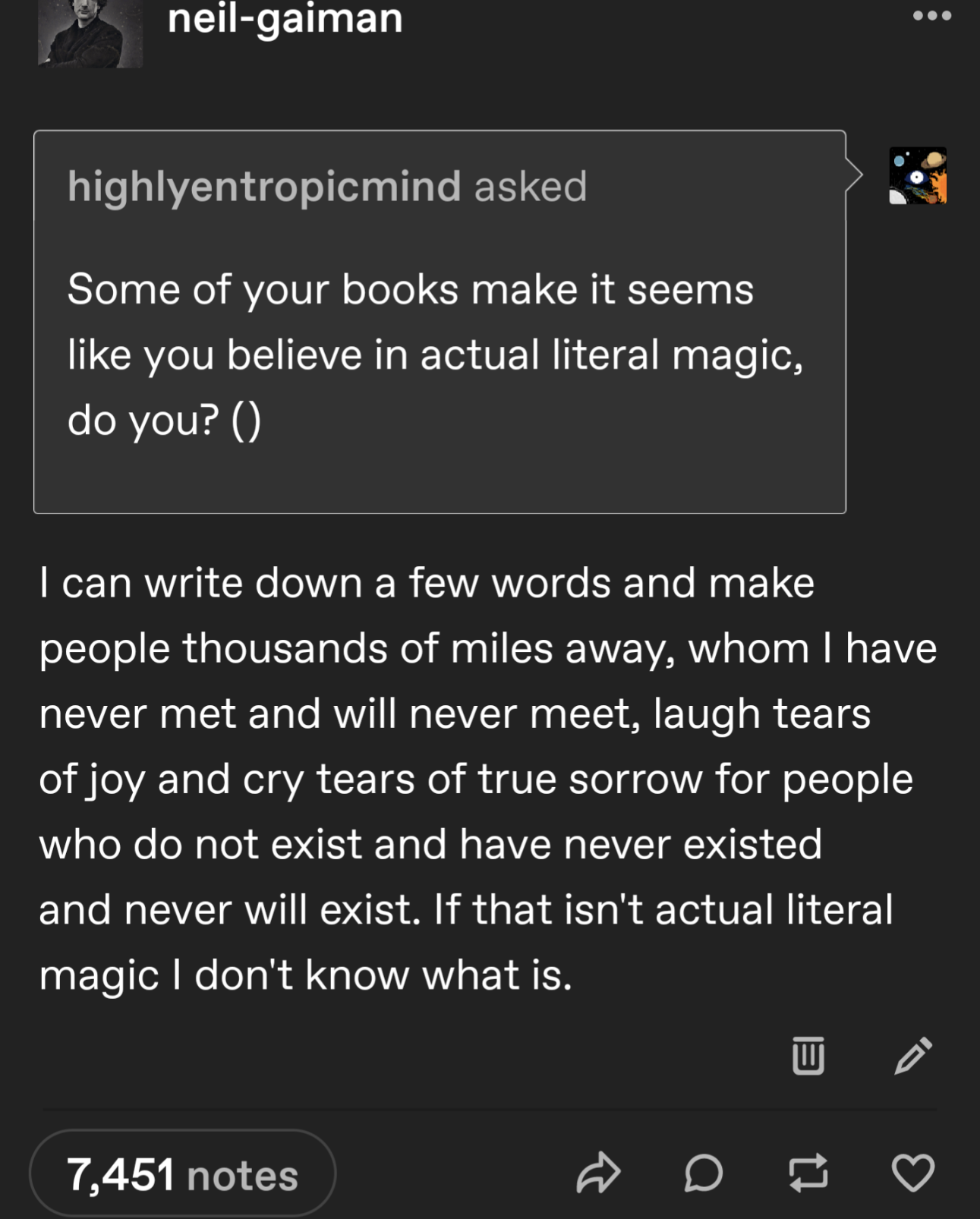Non Verba
"Life can be so much broader, once you discover one simple fact, and that is that everything around you that you call 'life' was made up by people who were no smarter than you. And you can change it, you can influence it, you can build your own things that other people can use." - Steve Jobs

Several years ago, a colleague gave me these cards as a joke for me to hand out when meetings got out of control (and available here for purchase):

It's a simple and humorous message, but I've been reflecting inwardly and taking that advice myself. I have one of these cards on my desk now as a token reminder to listen.
Generally, I am acutely aware of areas I need to work on for self-development, and I know I talk too much. I am grossly aware of it. There's almost nothing worse than when I join a video conference with 15 other people, and they're all staring silently at one another, waiting for the meeting to start. I'll randomly banter on about something completely ridiculous to avoid the silence.
I'd bet that if you ask your peers or colleagues, staring at 10-15 humans, each in a 1-inch square box, awkward with no one speaking awkwardly. No casual chatter. Research conducted at the University of Groningen in the Netherlands has shown that it only takes FOUR seconds of silence for people to start feeling rattled.
Is it learned behavior (how often do you put on background noise?) or something more profound? As a personal development goal, I'm trying to spend more time embracing being comfortable with silence.
It's been an interesting experiment; I'm trying to be aware of it and consciously sit back and absorb the room or situation. Just watch. Remove the feeling around the need to say anything. This shift quickly has become a more insightful way to build the muscle of reacting, not just responding.
Ask yourself, are you really listening? Or just waiting to talk.
Active listening is a concept often overlooked, but it also holds immense power when applied strategically, much like Law #4 from Robert Greene's influential book, The 48 Laws of Power.
Law #4, "Always Say Less Than Necessary," teaches us the value of restraint and the careful use of words.
When you are trying to impress people with words, the more you say, the more common you appear and the less in control. Even if you are saying something banal, it will seem original if you make it vague, open-ended, and sphinx-like. Powerful people impress and intimidate by saying less. The more you say, the more likely you are to say something foolish.
Learn the lesson: Once the words are out, you cannot take them back. Keep them under control.
Be particularly careful with sarcasm: The momentary satisfaction you gain with your biting words will be outweighed by the price you pay.
Active listening forces you to be more engaged with whoever is talking, capturing their words, underlying intentions, and emotions. It involves suppressing our desire to dominate the conversation and instead genuinely understanding the speaker's perspective.
This is valuable to gain insight into others' thoughts and motivations, allowing yourself to tailor responses accordingly and identify opportunities, vulnerabilities, and even power dynamics within interpersonal communication.
It's important insight towards shared understanding and provides more freedom when you go into a conversation without feeling that you need to talk consistently, add things, or need anything from it.
Not saying something can be more effective than saying anything at all.
So next time you find yourself in a situation where you are consciously paying attention to how much you talk, pause for a second and ask yourself, "why do I feel like I need to speak? Is it to just speak, or is there something valuable to add".
Remember: conversations are ultimately not about hearing, but also understanding.
If you enjoy these posts, you can buy me a coffee ☕️, check out my store or just share my work. If you'd rather just keep up with my daily ramblings, follow me via your favorite RSS reader, via Mastodon or keep reading my posts on this blog. Your support is much appreciated!
Mind Benders 🤯
It turns out, not doing their art was costing them time, was draining it away, little by little, like a slow but steady leak. They had assumed, wrongly, that there wasn’t enough time in the day to do their art, because they assumed (because we’re conditioned to assume) that every thing we do costs time. But that math doesn’t take energy into account, doesn’t grok that doing things that energize you gives you time back. By doing their art, a whole lot of time suddenly returned. Their art didn’t need more time; their time needed their art.
The question to ask with all those things isn’t, 'how do I make time for this?' The answer to that question always disappoints, because that view of time has it forever speeding away from you. The better question is, how does doing what I need make time for everything else? — [via Energy makes time]
Quotables 📚
On the topic of magic, written by Neil Gaiman himself:

- via https://mastodon.social/@neilhimself/110890933089005040
Brain Dump 🧠
Here are a few articles and videos that resonated with me over the last week:
- I'm still determining if I've latched on to the term 'enshittification,' but it describes many things recently. Cory Doctorow has a wonderful read on the state of 'The Cloud,' how services you once depended on just rot (i.e., Evernote), and what we can do to protect the Internet. — [via There is No Cloud]
- The A.I. glitter-bomb over my week continues, so I've been consuming a ton of information about LLMs (Large Language Models) recently. I enjoyed this deeper dive into the way that LLMs structure output. 'Languages are symbolic systems comprised of pairs of form and meaning. Something trained only on form, as all LLMs are, by definition, is only going to get form; it's not going to get meaning. It's not going to get to understanding.' — [via Language Is a Poor Heuristic For Intelligence]
- File this one under the ultimate tech debt. In Grand Rapids, Michigan, 19 schools have air conditioning and heat systems running off a 30-year-old Commodore Amiga. Not only that, but they call the high school student who originally programmed it (who lives in the area) when they have problems. I'd suggest get a Raspberry Pi at this point — [via 1980s computer controls GRPS heat and A.C.]
- Bookmarking this one in case I need to find a labyrinth sometime. This site provides the ultimate reference on 'labyrinths you can visit, including their locations, pictures, and contact details, are accessible here, along with information about the many types of labyrinths found worldwide.' — [via World-Wide Labyrinth Locator]
- Most of us have been taught that the "Hero's Journey" is a common template in storytelling in film and books, but this article counters the very origin of the theory, calling it nonsense. '*The reality is that Campbell's 'monomyth' is something of a Frankenstein's monster, cobbled together from different parts of various myths. No individual story written before Campbell's book was published actually follows Campbell's model exactly in its entirety for every single step. *' — [via The "Hero's Journey" Is Nonsense]
- Described as a parasite; 'to inoculate yourself don't delegate understanding. If you build your own understanding you will be the one who earns the dividends' — [via Don't delegate understanding]
- Music plays a big role in most of James Gunn's creations. Read this analysis of his various films and how the song selection for individual films integrates as part of his storytelling — [via Music, Arrested Development, and the GUARDIANS OF THE GALAXY]
- Talk about FOMO (fear of missing out); in a recent study, psychologists found that people are willing to undergo physical pain for 'functionally worthless information' rather than missing out. — [via Humans will trade pain for useless information]
- A bit of an older post, but I still agree with the possibilities on how AirPods are a platform for developers to experiment with new computing capabilities. — [via AirPods as a Platform]
- I hadn't seen this interview before between Chris Nolan and Adam Grant. During the discussion, Nolan talks about how 'it's all about trying new things. If you're going to write, you want to read a lot before you write, without any purpose. I love watching T.V., love watching movies, preferably with no sense of purpose. Just being open to things that might inspire you—and staying open.' — [via Christopher Nolan Reads "Without Purpose"]
- 15 years ago, a group of students from MIT were sued to not present at the Defcon conference regarding how they hacked the Boston subway. This past week, they finally presented the vulnerabilities they discovered that were never fixed. — [via Teens Hacked Boston Subway’s CharlieCard to Get Infinite Free Rides — and This Time Nobody Got Sued]
This Weeks Vibe 🎸
Closing out this week with a wonderful post from Thermal Corner, titled 'Be Good to Yourself'.
I am trying to take to heart the very true phrase. “Be kind to yourself”. It can be hard to step back and put things into perspective but it’s such a good mental reminder. You are probably going through a lot right now. Be kind to yourself, don’t make yourself feel bad for not being productive. It’s better to ship that app months after you intended instead of not at all. It’s better to spend time with your significant other or family than all your time on your side projects. Just remember be kind to yourself.
Be well. ✌🏻
